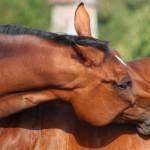Curbing Complications of Colic Surgery: Speeding Recovery in Horses

Owners often believe their horses are out of harm’s way if they survive colic surgery. In some instances, though, the actual surgery is less problematic than its aftermath. Horses sometimes develop postoperative ileus, defined as cessation of normal propulsive contractions of the intestinal tract, leaving patients at risk for further gastrointestinal distress.
Veterinarians recently explored “sham chewing” as a way to jump-start the intestinal tract following colic surgery, and a preliminary study revealed promising results. This idea stems from human medicine, where postoperative ileus is also an issue.
“In human patients, gum chewing mimics feeding and decreases the amount of time between surgery and first bowel movement. Sham chewing reportedly works by stimulating the cephalic-vagal reflex,” explained Catherine Whitehouse, M.S., a Kentucky Equine Research nutritionist.
To determine if sham chewing could promote gastrointestinal motility in horses, six horses were held off feed for 24 hours and slowly refed a typical postsurgical diet. Horses were placed in one of two groups. In the treatment group, an apple-flavored bit was placed in the horse’s mouth for 15 minutes every 6 hours; in the control group, no bit was used.
Contractions of the duodenum (the first section of the small intestine after the stomach) and borborygmi were evaluated every 12 hours, approximately 5 minutes after bit placement.* Borborygmi refers to the rumbling sounds made by the stomach and intestine as feed, forage, fluids, and gas pass through them, often noted as a sign of intestinal health.
Total gastrointestinal transit time was also assessed, measured by administering colored beads by stomach tube that were later collected in the horses’ feces.
“This study demonstrated that sham chewing significantly shortened transit time. Chewing on a flavored bit was both safe and well tolerated. Bit chewing may therefore provide veterinarians and owners with an inexpensive means of preventing postoperative ileus in horses,” Whitehouse said.
Encouraging intestinal movement improves survival postoperatively and decreases length of hospital stay and associated treatment costs. Compared to other techniques for managing postoperative ileus, such as injectable medications, bit chewing offers a cost-effective option that requires no special equipment and minimal labor investment.
“After surgery, reduced feed intake and decreased chew-time can increase the risk of digestive disorders. A digestive buffer can provide an extra level of support to recovering patients by reducing acidity in the stomach and the hindgut,” Whitehouse said.
*Patton, M.E., B.S. Leise, R.E. Baker, and F.M. Andrews. 2022. The effects of bit chewing on borborygmi, duodenal motility, and gastrointestinal transit time in clinically normal horses. Veterinary Surgery 51(1):88-96.








